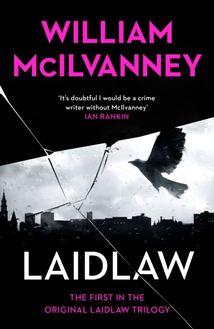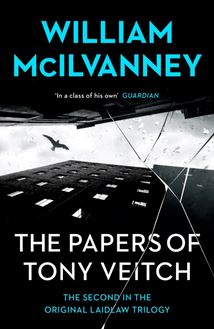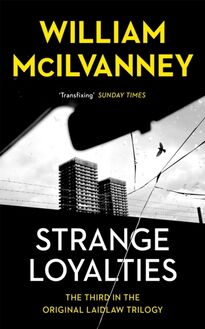Strange Loyalties , livre ebook
188
pages
English
Ebooks
2013
Vous pourrez modifier la taille du texte de cet ouvrage
Obtenez un accès à la bibliothèque pour le consulter en ligne En savoir plus
Découvre YouScribe en t'inscrivant gratuitement
Découvre YouScribe en t'inscrivant gratuitement
188
pages
English
Ebooks
2013
Vous pourrez modifier la taille du texte de cet ouvrage
Obtenez un accès à la bibliothèque pour le consulter en ligne En savoir plus
Publié par
Date de parution
03 juin 2013
Nombre de lectures
3
EAN13
9780857869999
Langue
English
Publié par
Date de parution
03 juin 2013
Nombre de lectures
3
EAN13
9780857869999
Langue
English
William McIlvanney is the author of the award-winningLaidlaw trilogy, featuring Glasgow’s original maverick detective.Both Laidlaw and The Papers of Tony Veitch gained Silver Daggersfrom the Crime Writers’ Association, while the third in theseries, Strange Loyalties , won the Glasgow Herald’s People’s Prize.He died in December 2015. Strange Loyalties is the third in the original Laidlaw Trilogy.
Also by William McIlvanney The Laidlaw Trilogy Laidlaw The Papers of Tony Veitch Other Novels The Big Man Remedy Is None A Gift from Nessus Docherty The Kiln The Weekend With Ian Rankin The Dark Remains
The paperback edition published in Great Britain and Canada in 2021 by Canongate Books Distributed in Canada by Publishers Group Canada First published in 2013 by Canongate Books Ltd, 14 High Street, Edinburgh EH1 1TE First published in Great Britain in 1991 by Hodder and Stoughton Ltd This digital edition first published in 2013 by Canongate Books canongate.co.uk Copyright © William McIlvanney, 1991 Extract from The Crime Interviews Volume Two: Bestselling Authors TalkAbout Writing Crime Fiction (Blasted Heath) © Len Wanner, 2012 The right of William McIlvanney to be identified as the author of this work has been asserted by him in accordance with the Copyright, Designs and Patents Act 1988 British Library Cataloguing-in-Publication Data A catalogue record for this book is available on request from the British Library ISBN 978 1 83885 621 2 eISBN 978 0 85786 999 9
For Liam
Here’s a nice jungle: glades of trust
Disturbed by parakeets of lust,
Pools of deceptive calm where need
Bathes among crocodiles of greed.
CONTENTS
ONE
Chapter 1
Chapter 2
Chapter 3
Chapter 4
Chapter 5
Chapter 6
Chapter 7
Chapter 8
TWO
Chapter 9
Chapter 10
Chapter 11
Chapter 12
Chapter 13
Chapter 14
THREE
Chapter 15
Chapter 16
Chapter 17
Chapter 18
Chapter 19
Chapter 20
FOUR
Chapter 21
Chapter 22
Chapter 23
Chapter 24
Chapter 25
Chapter 26
Chapter 27
FIVE
Chapter 28
Chapter 29
Chapter 30
Chapter 31
Chapter 32
SIX
Chapter 33
Chapter 34
Chapter 35
Chapter 36
Chapter 37
Chapter 38
SEVEN
Chapter 39
An interview with William McIlvanney
ONE
1
I woke up with a head like a rodeo. Isn’t it painful having fun? Mind you, last night hadn’t been about enjoyment, just whisky as anaesthetic. Now it was wearing off, the pain was worse. It always is.
I didn’t want this day. Who sent for it? Try the next house. I burrowed into the pillow. It was no use. A sleepless pillow. What was it they called that? Transferred epithet? My teachers. They taught me everything I don’t need to know.
I got up and went on safari for the pain-killers. There weren’t many places they could be. The bedroom was unlikely. That left the sitting-room, the small kitchen, the hall and the bathroom. The hall was out. There was nowhere there to keep them, unless I had cunningly hidden them under the carpet. The places were the kitchen or the bathroom. Deductive reasoning. Lucky I was a good detective.
After checking cupboards that held old razor blades and more dishes than I would ever use, I found the magic bottle. It was in the sitting-room behind the tiers of the change I hated keeping in my pockets. I got a glass of water and took two pills, feeling they wouldn’t be enough – like sending in two rookie policemen to quell a riot.
I came through and sat in the sitting-room. As memory returned, I wished it wouldn’t, because I did it again. I started to cry. For about a month now I had been doing that. The day would begin with tears. Maybe other people did exercises. I cried. Nothing dramatic, no wracking sobs. Just quiet and remorseless tears. They wouldn’t let up on me. The good thing was they didn’t last long.
After a few minutes they stopped. I wiped my face with my hand and stood up. At least today was the day I had decided I would start to do something about my tears. One of the two people I’d told of my intention had said I was crazy. But I’ve never said I was sane – just no more mad than anybody else I see around me. When we breakfast on reported mayhem and go to sleep having ingested images of national catastrophe like Mogadon, don’t anybody call me crazy.
I ran a bath and lay in it as if it were a ritual of cleansing more than physical. Heal me, holy water, and prepare me for the things I have to do. I don’t think it worked but the hot water helped my head. As the whisky sweated out of me, the miasma round my mind drifted up and mingled with the rising steam like mist clearing.
Maybe Brian was half-right. I wasn’t crazy. But maybe I was daft. We had a corpse. But did we have a crime? If we did, it wasn’t one you would find in the statutes. But then I didn’t believe in the statutes too much anyway. Mr Bumble got it wrong. The law isn’t an ass. It’s a lot more sinister than that. The law is a devious, conniving bastard. It knows what it’s doing, don’t worry. It was made especially to work that way.
I’ve seen it go about its business too often – all those trials in which you can watch the bemusement of the accused grow while the legal charade goes on around him. You can watch his eyes cloud, panic and finally silt up with surrender. He doesn’t know what the hell they’re talking about. He can no longer recognise what he’s supposed to have done. Only they know what they’re talking about. It’s their game. He’s just the ball.
I’ve been at trials where I had put the man in the dock and, fifteen minutes into the thing, I wanted to stand up and speak for the defence. ‘Listen,’ I’ve wanted to shout, ‘I caught this man on the streets. That’s where he lives. You lot ever been there?’ But they went on with their private party, listening to precedents like a favourite song, playing word games, applauding one another. Occasionally, the voice of the accused will surface among the gobbledygook, small and often wistful and usually sounding strange, like a Scottish accent heard in the midst of Latin. It’s a glimpse of pathetic human flesh, freckled and frail, seen through a rent in ermine robes, but quickly covered. Who’s this interrupting our little morality play? He doesn’t even know the script.
Those judges, I thought, as the water cooled around me. I do a lot of my thinking in the bath. Maybe that was one advantage of having rented an apartment with no shower. They lived as close to the world as the Dalai Lama. Never mind having little understanding of the human heart, they often didn’t have much grasp of the daily machinery of the lives they were presuming to judge. Time and again the voice had quavered querulously down from Mount Olympus, asking the question that stunned: ‘A transistor? What exactly do you mean by that?’ ‘UB40? Is that some kind of scientific formula?’ (‘Not a formula, Your Honour. A form. An unemployment form.’) ‘An unemployment form? And what is that?’
Did you have to check in your head at the door when you joined a club? Under those wigs, what strange heads mulled in port and pickled in prejudice?
‘Lawyers,’ I said to the ceiling above my bath. Who could trust them? They stuff their wallets with crimes and declare themselves the pillars of society. Their fees are often fiscal robbery but who can nail them but themselves? ‘A brilliant lawyer’ was a phrase I had often heard. That was all right if all you meant was an ability to play legal games. But what did that mean? Intelligence as a closed circuit. Intelligence should never be a closed circuit. Take them off the stage that is a law court, where the forms are all pre-set, and a lot of them wouldn’t know tears from rain.
I suppose you could say I was getting disillusioned with my job. I got out of the bath and pulled the plug, wiping away any suggestion of a tide-mark as the water drained. That was a technique I had learned since being on my own. It made the bath easier to clean. (Laidlaw’s Handy Home Hints For Single Men: first edition in preparation.)
I towelled myself. Naked, I didn’t like the softening belly. It wasn’t so bad with the clothes on. And besides, among others you usually pulled it in a little, put on the corsets of vanity. In the bathroom I just contemplated my navel and found it a bigger subject than I wanted it to be. Ah, those now gone days when I could eat a house and drink a brewery and still have a stomach like a plank nothing could warp.
Intimations of mortality bulged under the towel. Time was I seemed forever. Time was time hardly was. My life was an unknown continent and I was its only explorer. And what had I discovered? Eh, well, eh, life is . . . Thingmy. Give me another few years and I’ll have it sussed. But how many years were left? These days they passed so quickly. It was as if you stopped to mend a fuse and when you looked up another year had gone.
I remembered reading somewhere a theory about why time passed more quickly the older you got. The gist of it was this: when you’re ten, a year is a tenth of your life; when you’re forty, a year is a fortieth of your life. A fortieth is a lot less than a tenth. I was over forty. I didn’t try to calculate the decimal points. I just agreed with the principle.
But it was strange. Awareness of my own mortality gave me a boost. A shot of psychic adrenalin pumped through me and blew the last remaining tendrils of mist out of my head. If you stayed true to your experience, you needn’t fear age. It was only bringing you closer to understanding. I had always wanted understanding. Let’s see if we could find it.
I put on a clean pair of underpants. From small beginnings . . . I put a new blade in the razor. I squeezed shaving soap onto my palm from the dispenser. I soaped my cheeks, my chin, my upper lip. I had done away with the recent moustache. It made me look too much like a policeman – standard issue, along with the identity-card. I looked into the small round mirror like a porthole and a floating


